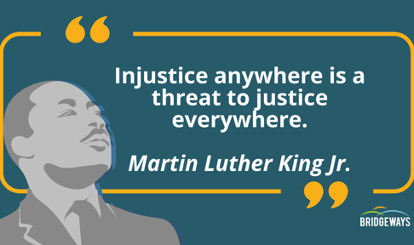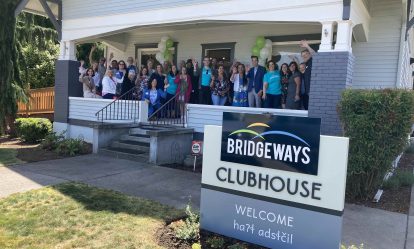by:
For individuals living with mental health challenges, recovery is not just about treatment—it’s about community, purpose, and opportunity. The Clubhouse Model is an internationally recognized, evidence-based approach that supports individuals in their journey toward independence, social connection, and meaningful work. At Bridgeways Clubhouse in Marysville, we embrace this model to create a supportive and empowering environment for our members.
What is the Clubhouse Model?
The Clubhouse Model is a community-based approach to mental health recovery that emphasizes peer support, shared responsibilities, and opportunities for meaningful engagement. Unlike traditional clinical settings, a Clubhouse operates as a voluntary membership community where individuals, known as “members,” work side by side with staff to run the daily operations. This includes activities such as administrative tasks, meal preparation, employment assistance, and social events.
The foundation of the model is built on the belief that everyone has the potential to lead a fulfilling life, regardless of their mental health challenges. Members are not just recipients of services—they are active participants in their own recovery.
Why is the Clubhouse Model Evidence-Based?
The Clubhouse Model has been rigorously studied and is recognized as an evidence-based practice by the Substance Abuse and Mental Health Services Administration (SAMHSA). Research has demonstrated that participation in a Clubhouse leads to positive outcomes in key areas, including:
- Employment and Economic Stability: Clubhouses provide transitional, supported, and independent employment opportunities, helping members build job skills and re-enter the workforce.
- Social Connection and Reduced Isolation: Members develop meaningful relationships and a sense of belonging, which significantly reduces loneliness and social withdrawal.
- Reduced Hospitalizations and Improved Mental Health: Studies show that Clubhouse participants experience lower rates of hospitalization and emergency care compared to those receiving traditional mental health services alone.
- Improved Housing Stability: Many Clubhouses assist members in securing safe, affordable housing, leading to increased stability and independence.
Established Clubhouses Around the World

Numerous Clubhouses across the globe have demonstrated the success of this model in supporting individuals with mental health challenges. Some well-known examples include:
Fountain House (New York, USA)
Founded in 1948, Fountain House is one of the first Clubhouses and has been a pioneer in advocating for the model worldwide.
A leading Clubhouse recognized for its employment programs and community integration efforts.
Pathways Clubhouse (Richmond, Canada)
Known for its strong emphasis on peer support and transitional employment opportunities.
Clubhaus Schwalbennest (Germany)
A European Clubhouse offering a supportive environment with a focus on vocational training and social reintegration.
These Clubhouses, along with many others, serve as shining examples of the effectiveness of the clubhouse model.
The Impact of Bridgeways Clubhouse
At Bridgeways Clubhouse, we witness the power of the model every day. Members who once felt disconnected and hopeless find purpose through meaningful work and social engagement. By fostering a supportive environment where everyone contributes, we help individuals build confidence, learn new skills, and take steps toward their personal goals.
The Clubhouse Model is more than a program—it’s a philosophy that transforms lives. If you or someone you know could benefit from this approach, we invite you to learn more and join our community at Bridgeways Clubhouse.
Get Involved
Bridgeways Clubhouse is always looking for community partners and supporters to help us expand our impact. Whether you’re interested in employment partnerships or donating, your involvement makes a difference. Contact us today to be part of this life-changing movement!
For more information, visit https://bridgeways.org/bridgeways-clubhouse/ or follow us on social media to stay connected.
RELATED BLOG POSTS
Bridging Communities: A Martin Luther King Jr. Day Reflection with Bridgeways Clubhouse
As we commemorate Martin Luther King Jr. Day, a day dedicated to honoring the legacy of a visionary leader who fought for equality and justice, it is essential to reflect on the progress we’ve made as a society in promoting inclusivity and uplifting marginalized communities.


